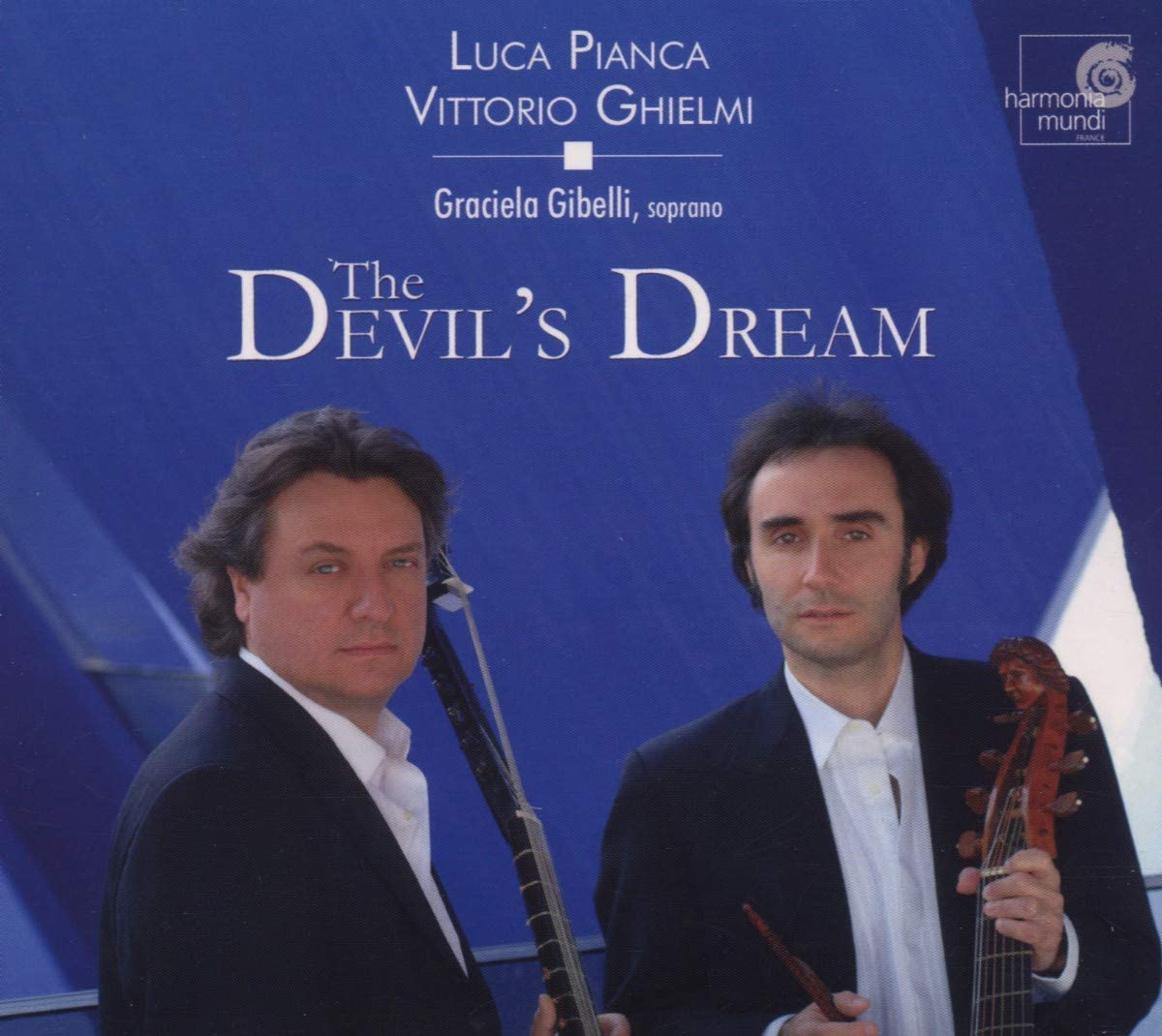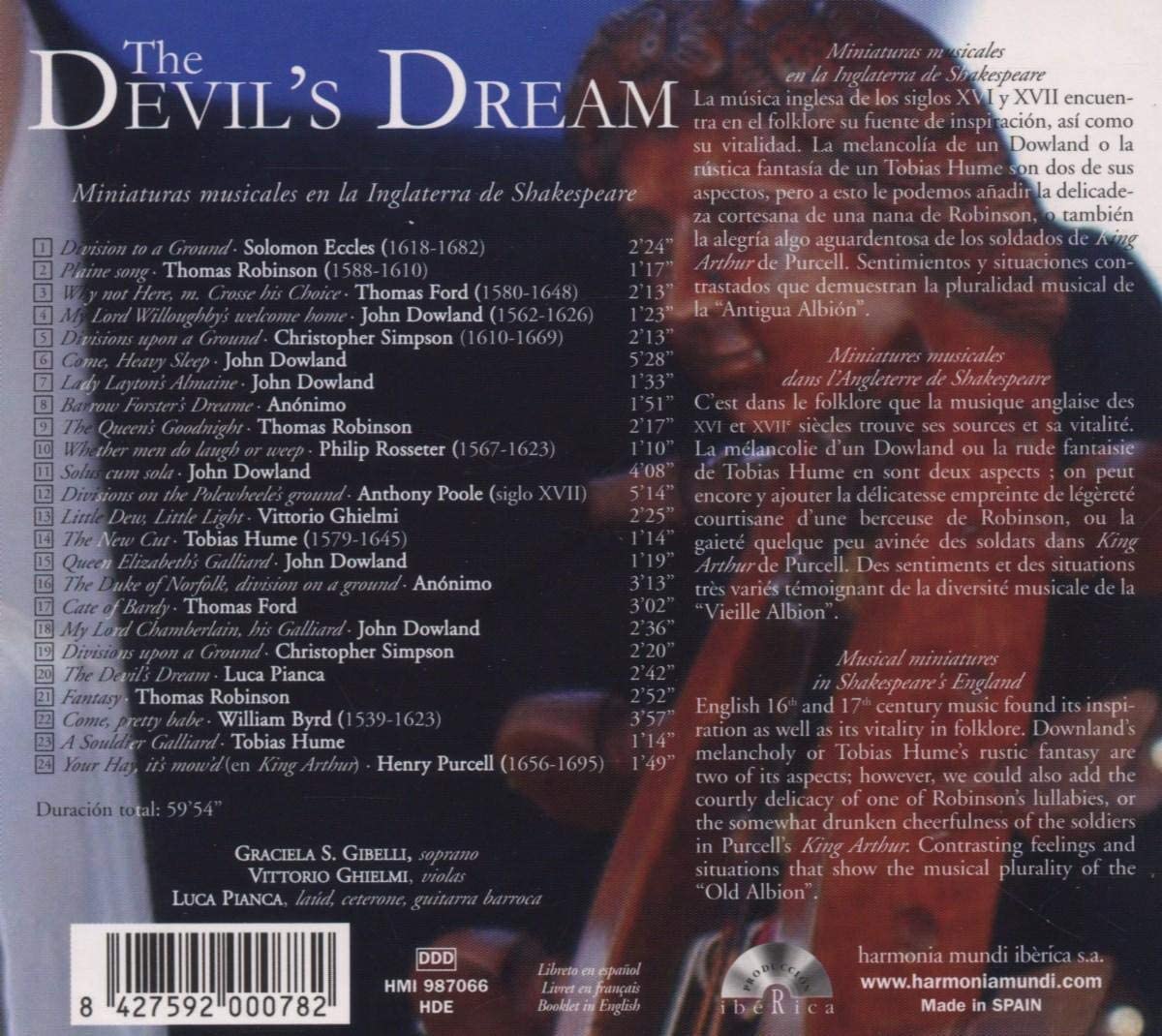
kompozytor
różni kompozytorzy
tytuł
The Devil'S Dream
pełny spis kompozytorów
Purcell, Henry;
Hume, Tobias;
Eccles, John;
Simpson, Christopher;
Robinson, Thomas;
Dowland, Ford, Thomas;
Rosseter, Philip;
Poole, Anthony
Hume, Tobias;
Eccles, John;
Simpson, Christopher;
Robinson, Thomas;
Dowland, Ford, Thomas;
Rosseter, Philip;
Poole, Anthony
wykonawcy
Pianca, Luca;
Ghielmi, Vittorio;
Gibelli, Graciela
Ghielmi, Vittorio;
Gibelli, Graciela
nr katalogowy
HMI 987066
opis
"English 16th and 17th century music found its inspiration as well as its vitality in folklore. Dowland's melancholy or Tobias Hume's rustic fantasy are two of its aspects; however, we could also add the courtly delicacy of one of Robinson's lullabies, or the somewhat drunken cheerfulness of the soldiers in Purcell's King Arthur. "Contrasting feelings and situations that show the musical plurality of the Old Albion."
• Thomas Robinson: Plaine Song
• Thomas Ford: Why Not Here, M. Crosse His Choice
• John Dowland: My Lord Willoughby's Welcome Home
• Christopher Simpson: Divisions Upon A Ground En The Division Viol
• John Dowland: Come, Heavy Sleep
• John Dowland: Lady Layton's Almaine
• Anonymous: Barrow Forster's Dreame en Ballet lyra-viol book
• Thomas Robinson: The Queen's Goodnight
• Philip Rosseter: Whether Men Do Laugh Or Weep
• John Dowland: Solus Cum Sola
• Anthony Poole: Divisions On The Polewheele's Ground
• Vittorio Ghielmi: Little Dew, Little Light
• Tobias Hume: The New Cut
• John Dowland: Queen Elizabeth's Galliard
• Anonymous: The Duke Of Norfolk, Division On A Ground En The Division Violin
• Thomas Ford: Cate Of Bardy
• John Dowland: My Lord Chamberlain, His Galliard
• Christopher Simpson: Divisions Upon A Ground En The Division Viol
• Luca Pianca: The Devil's Dream
• Thomas Robinson: Fantasy
• William Byrd: Come, Pretty Babe
• Tobias Hume: A Souldier Galliard
• Henry Purcell: Your Hay, It's Mow'd En King Arthur
Works:
Miniaturas Musicales En La Inglaterra De Shakespeare
• Solomon Eccles: Division To A Ground C
• Thomas Robinson: Plaine Song
• Thomas Ford: Why Not Here, M. Crosse His Choice
• John Dowland: My Lord Willoughby's Welcome Home
• Christopher Simpson: Divisions Upon A Ground En The Division Viol
• John Dowland: Come, Heavy Sleep
• John Dowland: Lady Layton's Almaine
• Anonymous: Barrow Forster's Dreame en Ballet lyra-viol book
• Thomas Robinson: The Queen's Goodnight
• Philip Rosseter: Whether Men Do Laugh Or Weep
• John Dowland: Solus Cum Sola
• Anthony Poole: Divisions On The Polewheele's Ground
• Vittorio Ghielmi: Little Dew, Little Light
• Tobias Hume: The New Cut
• John Dowland: Queen Elizabeth's Galliard
• Anonymous: The Duke Of Norfolk, Division On A Ground En The Division Violin
• Thomas Ford: Cate Of Bardy
• John Dowland: My Lord Chamberlain, His Galliard
• Christopher Simpson: Divisions Upon A Ground En The Division Viol
• Luca Pianca: The Devil's Dream
• Thomas Robinson: Fantasy
• William Byrd: Come, Pretty Babe
• Tobias Hume: A Souldier Galliard
• Henry Purcell: Your Hay, It's Mow'd En King Arthur
nośnik
CD
gatunek
Muzyka klasyczna
producent
Harmonia Mundi
data wydania
20-10-2006
EAN / kod kreskowy
8427592000782

(Produkt nie został jeszcze oceniony)
cena 58,00 zł
lubProdukt dostepny w niewielkiej ilości.
Wysyłka w ciągu 3 dni roboczych
Darmowa wysyłka dla zamówień powyżej 300 zł!
Darmowy kurier dla zamówień powyżej 500 zł!
sprawdź koszty wysyłki



































